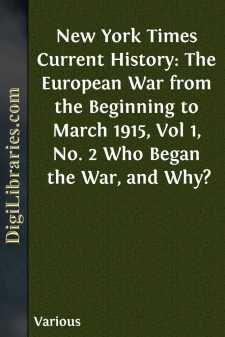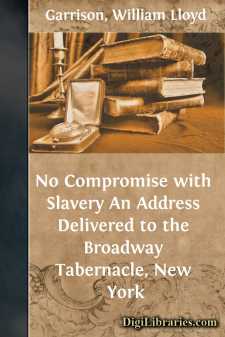History
- Africa 30
- Americas (North Central South West Indies) 50
- Ancient 68
- Asia 58
- Australia & New Zealand 8
- Canada 41
- Caribbean & West Indies 1
- Civilization 20
- Eastern Europe 12
- Europe 310
- Expeditions & Discoveries 60
- General 77
- Historical Geography 1
- Jewish 9
- Latin America 3
- Medieval 8
- Middle East 13
- Military 248
- Revolutionary 8
- Study & Teaching 5
- United States 353
- Western Europe 56
- World 13
History Books
Sort by:
by:
John L. Cotter
Part One Exploration: The Ground Yields Many ThingsByJohn L. CotterSupervising Archeologist, Colonial National Historical Park“As in the arts and sciences the first invention is of more consequence than all the improvements afterward, so in kingdoms, the first foundation, or plantation, is of more noble dignity and merit than all that followeth.”—Lord BaconIn the summer of 1934 a group of...
more...
by:
Various
WHO BEGAN THE WAR, AND WHY? THE CASE FOR GERMANY SPEECHES BY KAISER WILHELM II. From the Balcony of the Palace, Berlin, July 31, 1914. A fateful hour has fallen for Germany. Envious peoples everywhere are compelling us to our just defense. The sword is being forced into our hand. I hope that if my efforts at the last hour do not succeed in bringing our opponents to see eye to eye with us and in...
more...
by:
Various
"Common Sense About the War" By George Bernard Shaw. "Let a European war break out—the war, perhaps, between the Triple Alliance and the Triple Entente, which so many journalists and politicians in England and Germany contemplate with criminal levity. If the combatants prove to be equally balanced, it may, after the first battles, smoulder on for thirty years. What will be the population...
more...
by:
John Fretwell
"To be taken into the American Union is to be adopted into a partnership. To belong as a Crown Colony to the British Empire, as things stand, is no partnership at all. "It is to belong to a power which sacrifices, as it has always sacrificed, the interest of its dependencies to its own. The blood runs freely through every vein and artery of the American body corporate. Every single citizen...
more...
by:
John Gierlow
INTRODUCTION. Lewis Holberg, the author of the Narrative of Niels Klim, was the most eminent writer among the Danes in the eighteenth century. His works show a surprising versatility of genius, comprising Histories and Treatises on Jurisprudence, together with Satires and Comedies. He was by birth a Norwegian, but was educated at the University at Copenhagen in Denmark. Soon after receiving a...
more...
ADDRESS. Ladies and Gentlemen: An earnest espousal of the Anti-Slavery cause for a quarter of a century, under circumstances which have served in a special manner to identify my name and labours with it, will shield me from the charge of egotism, in assuming to be its exponent—at least for myself—on this occasion. All that I can compress within the limits of a single lecture, by way of its...
more...
by:
A. Stanley Blicq
Fed up! Every man of the Ten Hundred was fed up. Thirty-six hours cooped in cattle trucks, thirty or forty in a truck and inhaling an atmosphere that would have disgusted a pig—enough to feed anyone up. The Belgian frontier was crossed at sunset and the fringe of war's devastation penetrated. Little interest or casual comment was aroused, although a reputable thirsty one remarked that he thought...
more...
BRUMAIRE. THE OVERTHROW OF THE FRENCH DIRECTORY. The eighteenth century went out with the French Directory, and the nineteenth came in with the Consulate. The coincidence of dates is not exact by a year and a month and twenty-one days. But history does not pay much attention to almanacs. In general our century arose with the French Consulate. The Consulate was the most conspicuous political fact of...
more...
Adolfo Rodriguez was the only son of a Cuban farmer, who lived nine miles outside of Santa Clara, beyond the hills that surround that city to the north. When the revolution in Cuba broke out young Rodriguez joined the insurgents, leaving his father and mother and two sisters at the farm. He was taken, in December of 1896, by a force of the Guardia Civile, the corps d’élite of the Spanish army, and...
more...
by:
Philip Gibbs
I When Germany threw down her challenge to Russia and France, and England knew that her Imperial power would be one of the prizes of German victory (the common people did not think this, at first, but saw only the outrage to Belgium, a brutal attack on civilization, and a glorious adventure), some newspaper correspondents were sent out from London to report the proceedings, and I was one of them. We...
more...











